How Parents in a Canadian Public School System Learn About Their Children’s Diversity Education
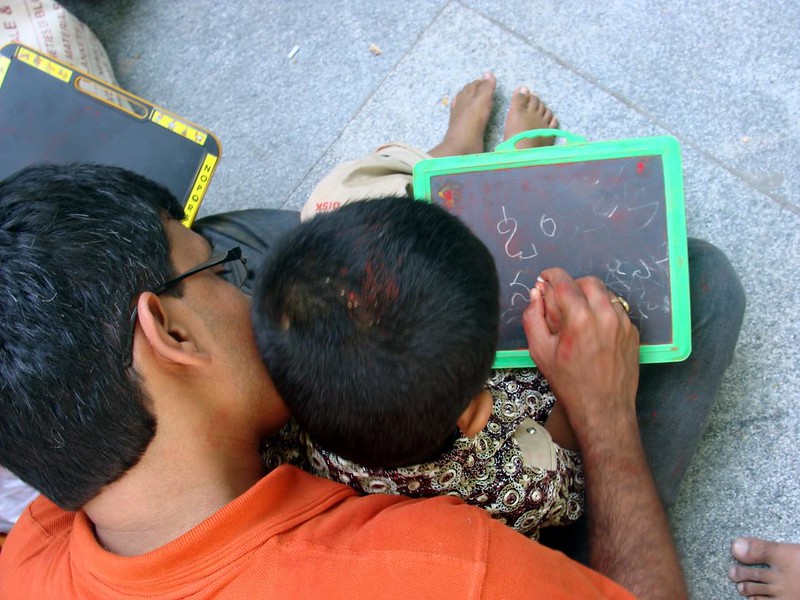
The General Problem
Sooke Schools 62 (SD62) launched its second strategic plan (2021-2025) in September 2021 after a year-long evaluation of the outputs and outcomes of the first strategic plan (2018-2021). As part of this evaluation, the district conducted a survey in April 2021 which was completed by 1,095 people, with 892 people (81.5% per cent) identifying as parents and 58 people (5.3% per cent) identifying as Indigenous (First Nations, Métis, and Inuit). A key finding from the survey was that the language in the strategic plan should be understood by everyone who would review it. Another finding was that the district should draft its strategic plan with a vision that included increased emphasis on inclusion, diversity, and equity.
The intent of the research project titled Speaking Across Barriers: How Parents in a Canadian Public School System Learn About Their Children’s Diversity Education (University of Victoria HREB #22-0136) was to aid SD62 in developing communication strategies and language which will help the parents, guardians, and caregivers of SD62 students and the greater SD62 community understand and support the inclusion, diversity, equity, and accessibility (IDEA) objectives within the 2021-2025 strategic plan.
The Research Questions
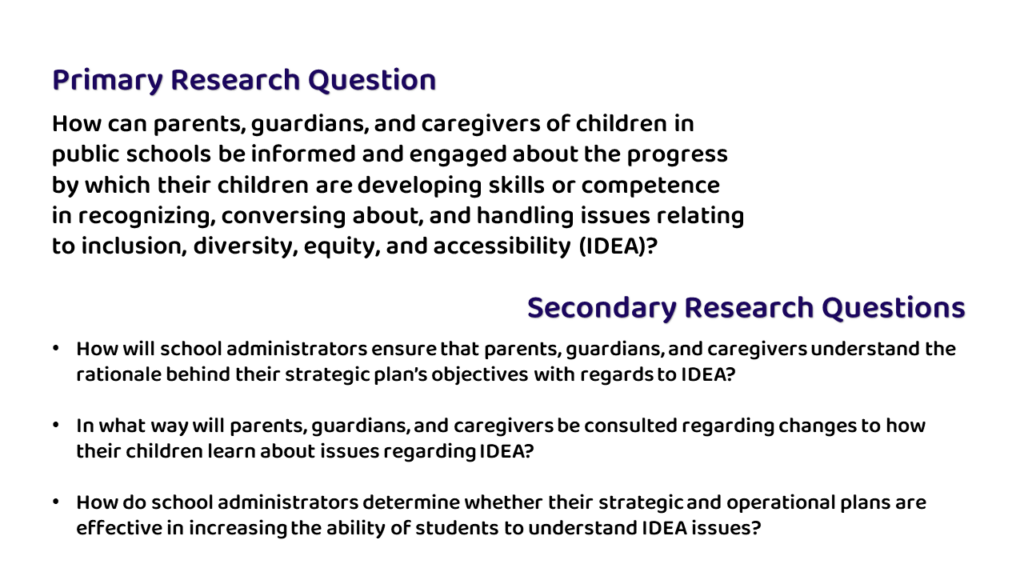
The Research Team
Principal Supervisor
Dr. Evert Lindquist (he/him) is a professor with the School of Public Administration with the University of Victoria. He joined the SPA in 1998, serving as the Director until 2009 and again from January 2012 to June 2015. Professor Lindquist has been the Editor of Canadian Public Administration, the journal of the Institute of Public Administration of Canada since January 2012. He was awarded BC Lieutenant Governor’s Silver Medal Award for Excellence in Public Administration, Institute of Public Administration of Canada (Vancouver/ Victoria Regional Groups), 23 June 2016.
Second Reader
Dr. Sarah Marie Wiebe (she/her) is an Assistant Professor in the School of Public Administration at the University of Victoria. She teaches in the Masters of Community Development program, is the Co-Founder of the Feminist Environmental Research Network and a Board Member of the Climate Disaster Project. Dr. Wiebe is the author of several books, including Life against a State of Emergency: Revitalizing Treaty Relationships from Attawapiskat and Everyday Exposure: Indigenous Mobilization and Environmental Justice in Canada’s Chemical Valley. Her research and teaching interests include environmental justice, public engagement and deliberative democracy. As a community-engaged researcher and mixed media storyteller, much of her scholarship incorporates themes related to sustainability, design justice and community filmmaking. For more about Dr. Wiebe’s research see: www.sarahmariewiebe.com and follow her @smwiebe.
Second Reader
Dr. Lyndze Harvey (she/her) is an Assistant Teaching Professor in Curriculum & Instruction, Faculty of Education at the University of Victoria. She also teaches in the Educational Psychology and Leadership department and acts as a Practicum Supervisor for Teacher Education at the University of Victoria.
Principal Researcher
Trisha L. Renken-Sebastian (she/her) completed her Masters degree in Community Development at the University of Victoria in December 2023 and will be awarded her degree in June 2024. She is currently open to employment either within the provincial or local government or a nonprofit organization to help young people of color find their way safely in the world. You may read more information on the About page.
Executive Summaries, Announcements, and Reports
Survey Recruitment Announcement #1
Survey Recruitment Announcement #2
Final Capstone Project Report (UVic Space)
Options and Recommendations for SD62
There are several recommendations which can be undertaken by SD62 to improve the level of understanding which parents, guardians, and caregivers have regarding the school district’s efforts to improve how IDEA is experienced in the district.
For SD62 Operational Plan 2024-2025
This first set of recommendations include implementation activities which could be folded into operational plan for the upcoming school year 2024-2025. These recommendations were chosen because they are achievable by one or two people working semi-autonomously, they are projects which can be completed within a four to six month period, they do not require (much) additional funding, and they naturally flow from the existing 3 years of operational plans.
Create documents which define the concepts within IDEA for the district.
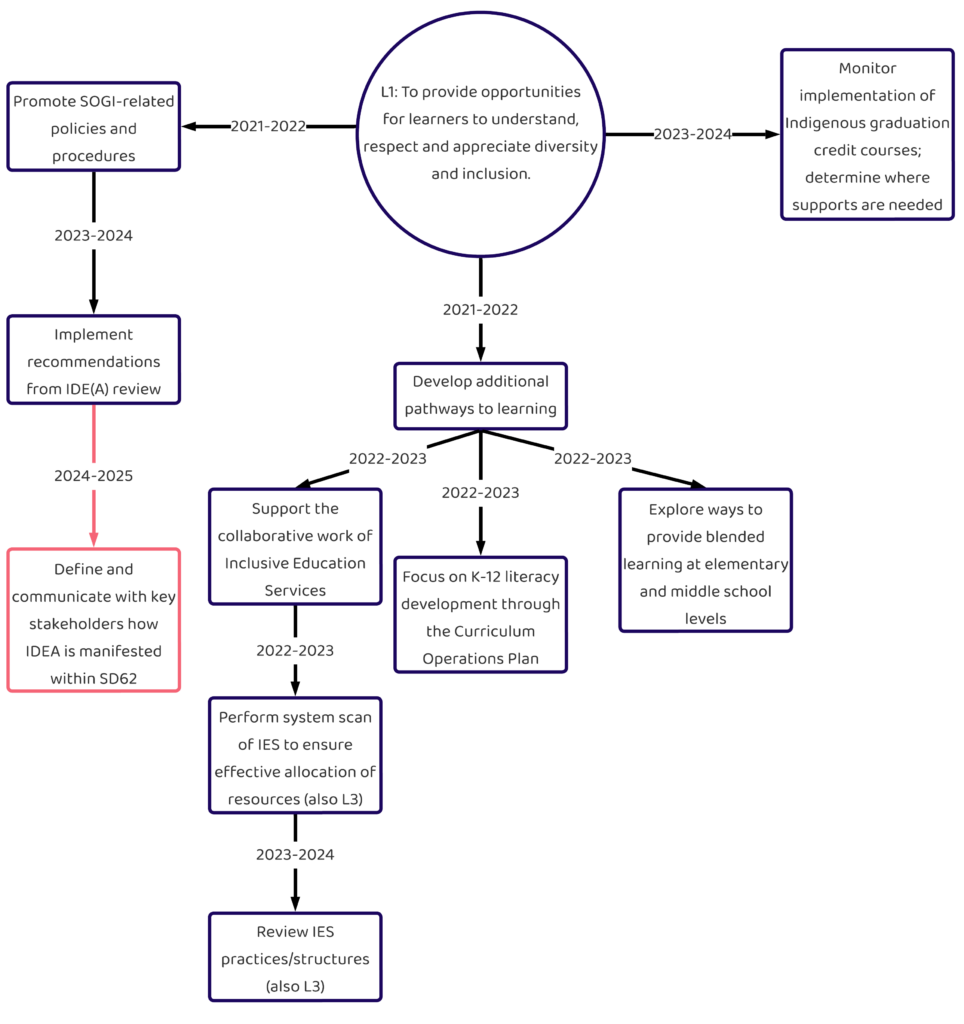
Building upon the effort in SD62 Operational Plan (2023-2024) to “provide opportunities for learners to understand, respect, and appreciate diversity and inclusion” (aka Learning Objective 1; 2023, p. 7), it would make sense that the following year’s Operational Plan would include a document and/or separate part of the SD62 website that provides definitions and examples of how the district will ensure that all students gain the benefits of becoming competent when navigating issues related to IDEA. Additionally, workshops and professional development opportunities to create a shared understanding of how SD62 experiences and implements IDEA could help by ensuring that members of all the key stakeholder groups in the district have the same level of understanding.
Establish an online archive of livestreamed public Board and committee meetings
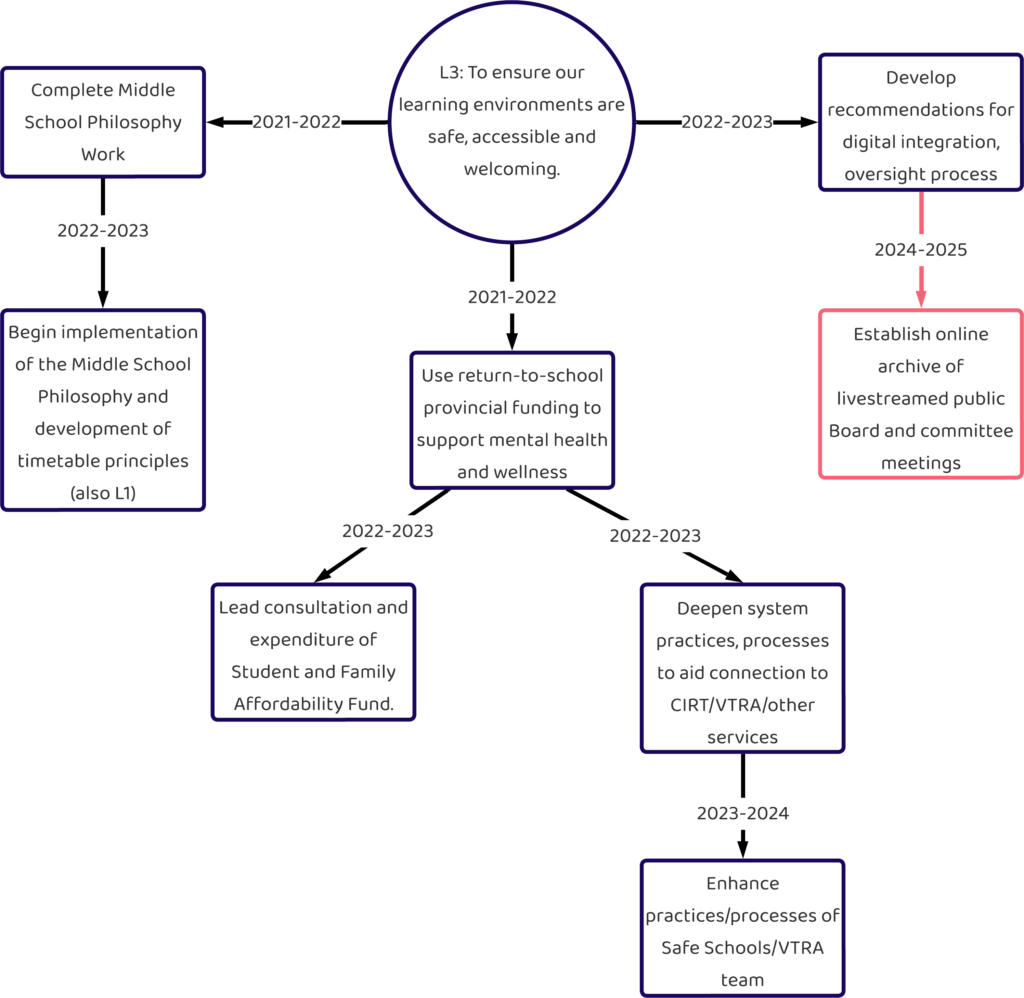
In the 2023-2024 Operational Plan, SD62 hopes to “develop a digital governance policy that…articulates the structures and processes necessary to maintain digital assets” (2023, p. 12). A natural progression from these first two operational objectives in service of Engagement Objective 3 would be to undertake an examination of the software solutions available to public school districts for public Board and committee meeting administration with the goal of determining 1) if the district can continue to self-host their archived meeting documents and videos and 2) how to best make such an archive readily available to the public without encountering any risks that are beyond what is possible under the District Risk Management plan.
Continue to enhance the Strategic Communications plan and the department’s suite of tools
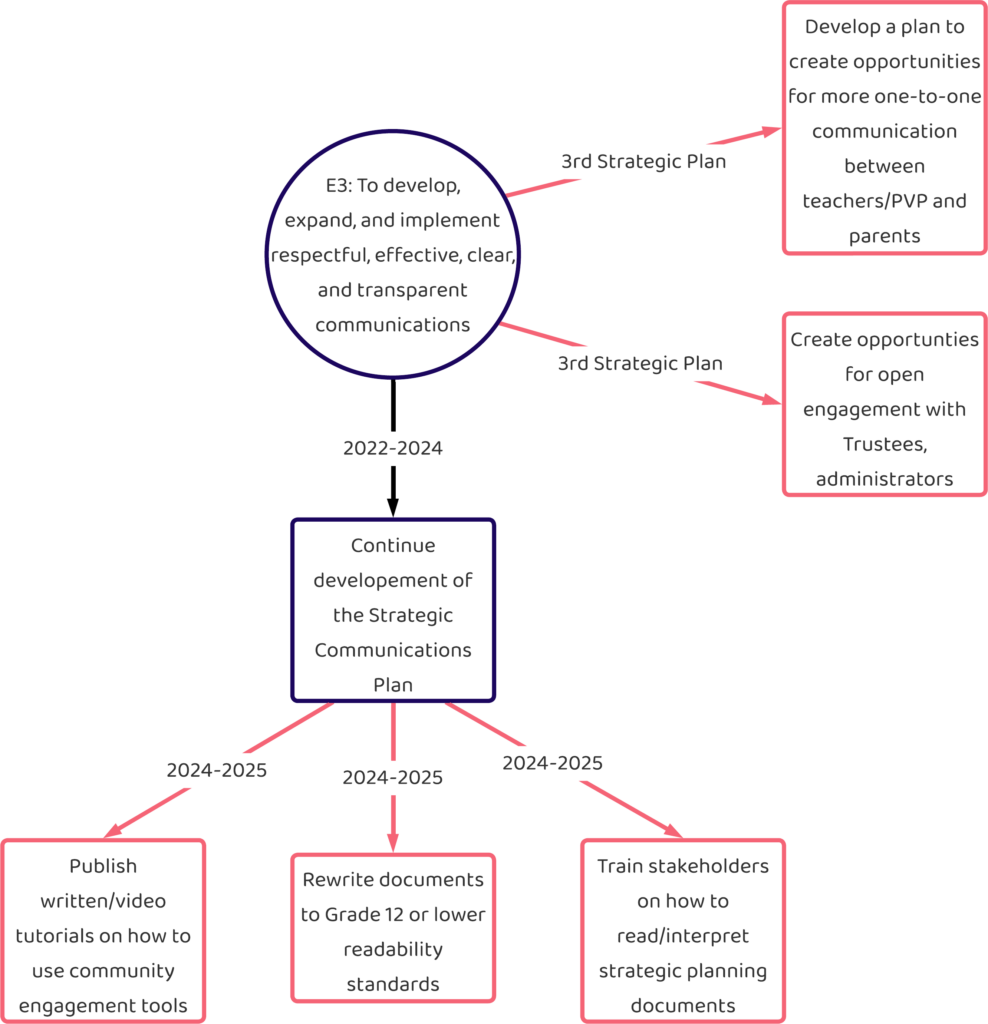
Related to the previous recommendation, the district Strategic Communications Plan can be enhanced to include several implementation activities aimed at improving communication about the district’s strategic plan, providing informational updates to policies, regulations, and procedures, and enticing parents, guardians, and caregivers to engage with the district in ways which are convenient for them. The completion of one or two of the following tasks in the next school year could move the district closer to achieving one of its Engagement Objectives:
- Publish written/video tutorials on how to use community engagement tools.
- Rewrite documents to Grade 12 or lower readability standards.
- Train stakeholders on how to read and interpret strategic planning documents.
For SD62 Strategic Plan 2025-20XX
This second set of recommendations include implementation activities which could be deliberated and included in the forthcoming strategic plan which will take effect starting in September 2025. These recommendations were chosen because they require extensive collaboration with key stakeholders in the district and other community partners, they employ strategies from systems thinking and can use leverage points to create more substantive and lasting social change within the district, and emergent information and events may reveal different priorities which may take precedence.
Incorporate local Indigenous ways of knowing and doing into organizational practices
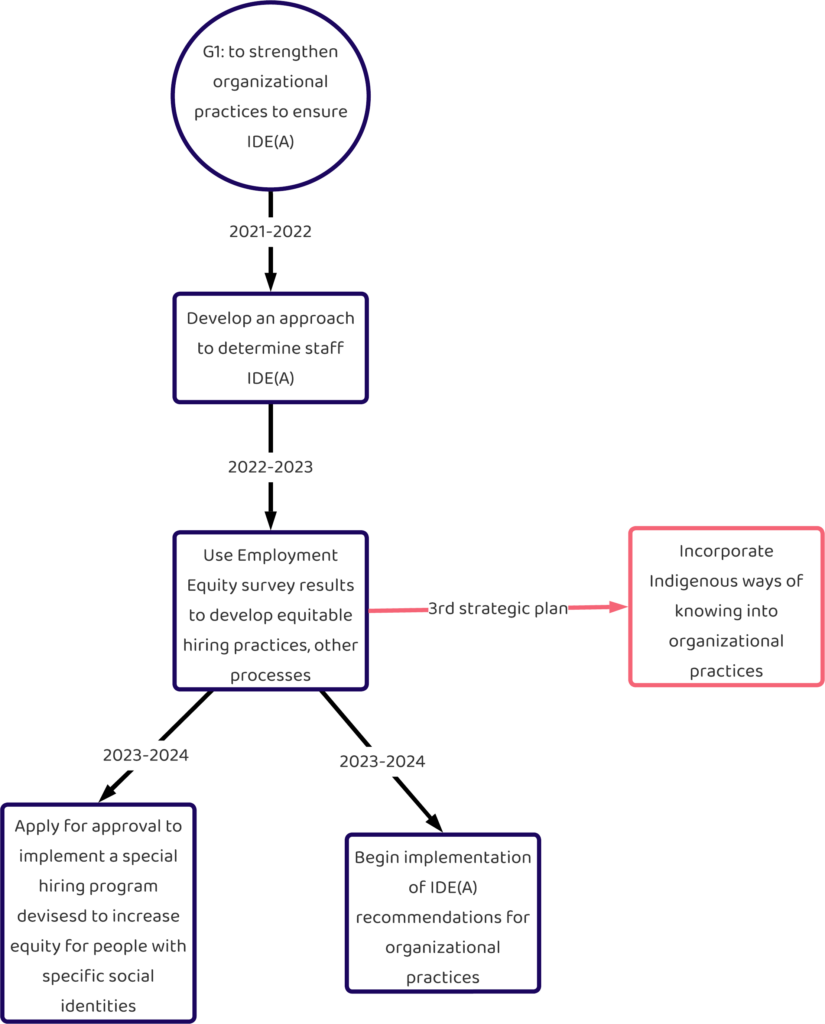
As an improvement to how SD62 runs their Board and committee meetings and part of Growth Objective 1 (“to strengthen organizational practices to ensure equity, diversity, and inclusion” 2023, p. 11), it could help to learn from T’Sou-ke First Nation and Sc’ianew First Nation and Nuu-chah-nulth: Pacheedaht Nation the words and language that they use to describe the concepts that align with basic parliamentary procedures to devise a new parliamentary procedure which is wholly unique and specific to the people who live within SD62. This is work that could begin prior to the release of the third SD62 strategic plan with a discussion with the Na’tsa’maht Education Council and incorporate consultation and feedback from other groups of Indigenous parents in the district.
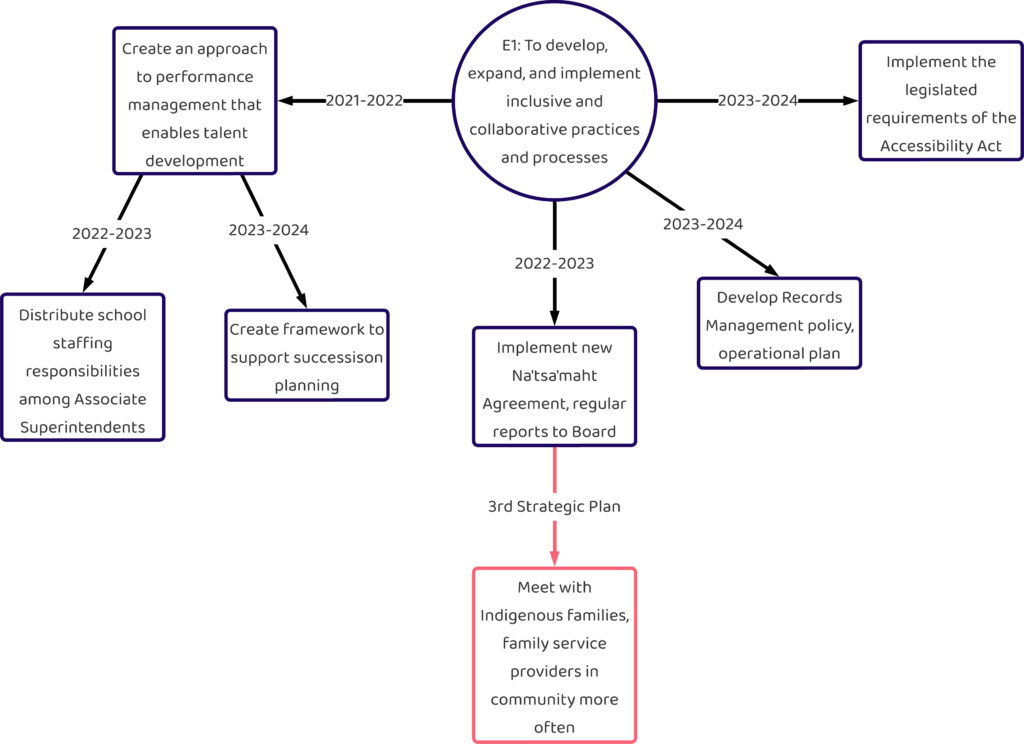
Additionally, to further support Engagement Objective 1, there should also be regular opportunities for SD62 Trustees and the administrators of the schools located closest to T’Sou-ke First Nation and Sc’ianew First Nation and Nuu-chah-nulth: Pacheedaht Nation to meet on the traditional territories with Indigenous parents, guardians, and caregivers in a town hall-style meeting, speak with them directly about the progress in achieving NEA (Na’tsa’maht Education Agreement) objectives, and learn from them what they would need to support their children’s educational success. The reason why this option is listed separately from others in this section is that this type of engagement activity could also strengthen the ties the Trustees and administrators have with the three First Nations and thus more tightly align the goals, objectives, and the progress of the NEA initiatives with the overall strategic plan.
Create opportunities for open engagement with SD62 Trustees and administrators
As part of Engagement Objective 3 (Figure 4) and separate from engagement with parents, guardians, and caregivers of Indigenous students, one strategic activity could be the creation of opportunities for regular in-person and online town hall style meetings where Trustees and administrators could both update parents, guardians, and caregivers of the strategic plan and operational plan efforts which are being implemented and hear feedback from them regarding the strategic plan initiatives to date. These could also be facilitated by community and family service organizations who serve specific types of student populations (such as those with diverse educational needs or students of colour) within the community who can directly assist parents and children with finding and acquiring the resources they need.
Also, while keeping in mind that the amount of time that teachers have for preparing lesson plans and doing other administrative/clerical work either before or after a full day of teaching students is limited, an organizational practice that the district could work on implementing in the forthcoming strategic plan could be a more systematic method for learning how frequently parents would prefer to hear from their students’ teachers and the preferred methods of contact. In addition to facilitating the kinds of communication interactions parents, guardians, and caregivers would be more likely to respond to, this could have the added benefit of creating a more positive interaction between teachers and district administration through the successful completion of a shared strategic planning project.
References:
Sooke Schools District 62. (2023). Sooke School District 2023-2024 Operational Plan. https://www.sd62.bc.ca/sites/default/files/docs/board-ofeducation/Operational%20Plan%202023-2024%20(19).pdf
Capstone project design inspired by ShidaBluDesign.
This work is licensed under CC BY-NC-SA 4.0.